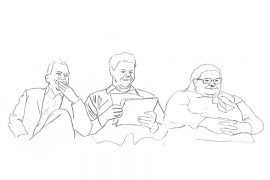“Joshua Cohen” is a satire, which is itself a form that relies on irony. (As an aside, the colloquial use of “ironic” to denote something merely interesting or coincidental is wrong. Thus the Alanis Morissette song “Isn’t It Ironic?” lists events that are not ironic, but the song is itself ironic insofar as it repeatedly fails to correctly identify irony.) In our time, irony is the default position, the tone of first resort; constant ironic indifference as the standard mode of engagement with the world allows people to jeer without becoming vulnerable or susceptible to criticism—it’s only a joke. There’s nothing intrinsically wrong with irony, but because it is by nature a destructive rather than constructive device, if it is the prevailing mode of engagement, then the discourse becomes skewed and imbalanced. The perpetual competition to demonstrate superiority and detachment never leads anywhere, never builds anything.
This is not a new observation. David Foster Wallace diagnosed the problem in an essay called “E Unibus Pluram: Television and U.S. Fiction,” originally published in 1993. With the integration of euphemistic politics and extremist views into the mainstream over the last five years, the problem has become more pronounced. What Wallace recognized was what we might think of as hipster-grade irony: we’re cool and we do uncool things to show how uncool those things are and how cool we are by comparison. Wallace himself, despite calls in the piece for earnestness, never quite broke from this brand of irony. What now plagues our society is dangerous euphemism, often not irony at all, but only called that to cloak its real function. Consider, among many possible examples, that Trump defended his claim that Obama had wiretapped him by claiming that the statement was ironic, that it was in fact a kind of sarcastic joke. Consider also West Virginia politician Eric Porterfield, who, when asked in an interview how he would react if his children came out as gay, said he would “see if they can swim;” when pressed to elaborate, he asserted that he meant engaging in outdoor activities. In these cases, and the many others so sadly typical of our day, perfidious speakers disingenuously claim that baseless accusations and thinly veiled threats are either “ironic” or meant only in a narrow sense that is not congruent with the undercurrent of meaning.
The use of irony to obfuscate the intended meaning allows the speaker to disavow responsibility for his or her words. When this is the norm, as it currently is, the result is that words become meaningless and people can behave repugnantly with impunity. Rather than being a corrective to balance stilted old values, irony is now a posture from which people use language to attack one another without taking responsibility.
Despite these problems, I chose to write a piece of satire because the form may yet be redeemed. A narrative satire can entertain and educate by using selective exaggeration to illuminate truth. This is precisely what I hope “Josh Cohen” does. There the irony serves to illustrate a point and take a stand against the moral bankruptcy of the president. The piece is not fake news because it is clearly a fabulist view of reality meant to expose falsehood. It is not a lazy, fashionable, hip irony because it takes a clear and simple moral stand (the Republican party is so far from being Christian that Jesus Christ himself would be the target of their ridicule and scorn). This in turn exposes the piece to criticism, which makes it part of an ongoing debate rather than a threat of violence, a personal attack, or anything fostering anti-intellectual incivility over investigation.
I hope that this piece amply demonstrates how the dominant party occupies a moral position that has no relation to the radical teachings of Jesus Christ in the Gospels; like the hypocrites in those texts, they use scripture as a prop to confer the appearance of rectitude, but never bother to abide by the ethical codes therein. It seems unlikely that Josh Cohen, an ethnic minority and independent candidate with a radical political agenda, or anyone much like him will be sworn in as president in January. Nonetheless, please join me in doing the right thing by repudiating unctuous speech—ours, our acquaintances’, and our politicians’—and being genuine, even when being ironic.
Main illustration by Josh Gates





